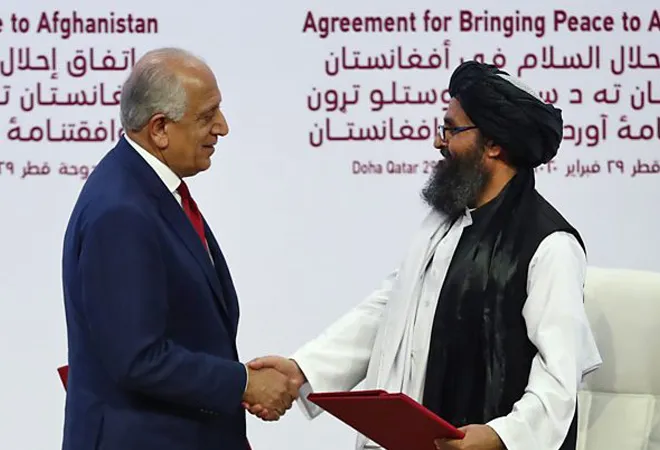-
CENTRES
Progammes & Centres
Location

Ending America’s “forever wars” were a key plank of Donald Trump’s successful presidential election campaign in 2016. On 29 February, the Trump administration appeared to have taken a significant movement towards fulfilling that pledge when it signed an agreement that seeks to end America’s longest-ever war, in Afghanistan.
The US and Taliban signed a deal in Doha on 29 February, which is slated to be the first step towards ushering in an era of peace, stability and progress in Afghanistan after savage, devastating 40 years of civil war and foreign occupation.
However, signs have already emerged that the deal is rickety — and an excuse for the Trump administration to cut and run from Afghanistan, disregarding all the “blood, treasure and treasury”, in the President’s own words, the US had invested over 18 years to create a peaceful, progressive and modern nation.
The accord had laid down a timetable for a gradual drawdown of American troops from Afghanistan in exchange for guarantees from the Taliban not to allow trans-national terrorist groups such as Al Qaeda to operate territory under their control. Talks between the Taliban and the Afghan government — which until now, the Taliban routinely denounced as a US puppet and refused to deal with — are due to begin by 10 March, before which both sides are set to swap thousands of prisoners.
Just two days after the Doha pact, discordance has set in over the prisoner exchange, as President Ashraf Ghani has announced that his government has not pledged to free 5,000 Taliban prisoners it has in its captivity. He said such a prisoner release “cannot be a prerequisite for talks”, but must be part of negotiations.
The Taliban responded on 2 March by saying that the talks would not go ahead if the Taliban prisoners held by the government were not released. The group has announced that a “reduction in violence” in the week leading up to the agreement has ended and its military operations against the Afghan security forces will continue as normal, though it will desist from attacking foreign forces to honour the US-Taliban pact.
The pact was signed after a week-long partial truce, called “reduction in violence” week, ended across Afghanistan in which the Taliban, Afghan National Army and US-led Nato forces refrained from launching attacks against each other as a confidence-building gesture and also to demonstrate that the Taliban can rein in their forces.
According to the deal, after an initial reduction of troops to 8,600 (out of an estimated 13,000) within 135 days of the deal’s signing, the US and its partners will complete the withdrawal of all remaining forces from Afghanistan within 14 months. If the Taliban keep their end up, the US will lift sanctions against the Taliban and work with the UN to remove its separate sanctions against the group.
It is a no-brainer that the exit of US troops from Afghanistan after the peace agreement will be glorified by President Trump as an incredible foreign policy accomplishment in an election year in the US. However, the deal hinges heavily on how the talks between the Kabul government and Taliban progress, a process in which the US has little, and Pakistan an outsized, control and influence.
Under relentless American diplomatic and financial pressure (such as stopping all military aid, dragging Pakistan to Financial Action Task Force and attaching stringent conditions to release an IMF loan Pakistan desperately sought) following President Trump’s Afghan strategy announcement in August 2017 and a so-called reset in US-Pak relations following Secretary of State Mike Pompeo’s visit to Islamabad in September 2019 (during the visit, he had made clear that Pakistan will have to back the Trump administration’s Afghan strategy if it wants good relations with Washington), Pakistan has ensured that the US-Taliban talks were successful.
Pakistan has said that it was impossible to cut a deal without its efforts. In a statement issued on February 22, Minister for Foreign Affairs Shah Mahmood Qureshi claimed Pakistan had played a pivotal role in constructing a roadmap for peace in Afghanistan. “Pompeo told me (during the September 2019 visit) that the pathway to fixing relations between Pakistan and US came through Kabul. Now I would like to remind him that we have fulfilled all our promises,” he said.
Pakistan is obviously happy about its role in brokering the deal. However, it is worrying that the Trump administration seems to be nonchalant to the Afghan peace process beyond troop withdrawal timetables and facile pledges on defeating terrorism. US officials say the eventual withdrawal of all US troops from Afghanistan will be contingent less on any specific outcome in the intra-Afghan peace dialogue about the country’s future and more on Taliban meeting commitments to counter terrorism, broadly described as they honouring their pledges. President Trump, after the deal’s signing, has echoed this sentiment, saying that it is time for someone else to do the task of combatting terrorism and “it will be the Taliban and it could be surrounding countries”. However, he warned that that “if bad things happen, we’ll go back with a force like no-one’s ever seen”.
One of the “surrounding countries”, Pakistan, has invested immensely in Afghanistan’s political future — and paid a terrible price (a Kalashnikov culture in the country, brutal Islamist terrorist blowback, a radicalised, intolerant society, millions of refugees, international censure and ignominy over its support for Taliban, to name the foremost among them) — in its elusive search of “strategic depth” against India in Afghanistan. Since 1994, the Taliban were Islamabad’s favoured instrument to achieve that goal.
Pakistan also knows how to get its way in Afghanistan without creating any “bad thing” the American President cares about. For its part, India could anticipate stepped-up jihadi terrorism in Jammu and Kashmir and should, therefore, augment its defences to foil it. India should also be proactive enough to engage the Taliban to protect its interests in Afghanistan.
It was the same President who, in his first public pronouncement of 2018, expressed his exasperation over Pakistan’s support for terrorists in Afghanistan even as it pocketed billions of dollars in aid America “foolishly” gave to Islamabad over 15 years.
Little over two years later, it would be naïve for President Trump now to expect that Pakistan’s four-decade old outlook and attitude on peace and stability in Afghanistan and using terrorism as a foreign policy tool has changed on a dime.
In December 2019, The Washington Post published Afghan Papers, confidential trove of government documents obtained by the paper. The documents revealed that senior US officials failed to tell the truth about the war in Afghanistan throughout the 18-year campaign, making rosy pronouncements they knew to be false and hiding unmistakable evidence the war had become unwinnable.
As the Afghan Papers have offered a stark, pervasive account of the American intervention in Afghanistan 2001, there is reason to believe that the Trump administration is trying to ditch the country for political expediency.
According to reports, Taliban commanders have already started boasting of winning the war and defeating the US “imperialists” in Afghanistan. With an upper hand in the battlefield in terms of area under control and initiating attacks, it will not be easy to make them commit to a give-and-take deal. Taliban’s intransigence, more so with Pakistan’s connivance, could unravel the peace and show the hollowness of US claims of achieving its objectives.
There is also a question of the kind of Afghanistan the Taliban wants in future. In an opinion piece in The New York Times on February 20 entitled ‘What We, the Taliban, Want’, Sirajuddin Haqqani, the kingpin of the feared Haqqani network, conveyed a loaded message to the world: “I am confident that, liberated from foreign domination and interference, we together will find a way to build an Islamic system in which all Afghans have equal rights, where the rights of women that are granted by Islam — from the right to education to the right to work — are protected, and where merit is the basis for equal opportunity.”
It is disconcerting that the top leadership of the Taliban still employs the same language it used when the group took control of much of Afghanistan in 1996 and began brutalising it with strict Islamic rule. Such aggressive declarations from the Taliban are a precursor and underlines the need for the US to stay engaged in the Afghan peace process and beyond.
The views expressed above belong to the author(s). ORF research and analyses now available on Telegram! Click here to access our curated content — blogs, longforms and interviews.

Rajiv Jayaram is a New Delhi based researcher and journalist with over 25 years of experience covering South Asian affairs. He worked with ORFs Pakistan ...
Read More +